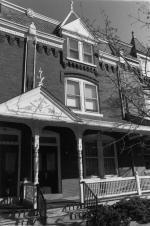If this kind of levity was rare in Pennsylvania German society, another side of the young Buchman had already begun to show itself. His mother, whose cousin had been a distinguished divine, cherished the desire that her son, too, should become a minister, and the boy appears to have accepted the commission readily enough. He recalled, at the age of 83, one incident which may have helped to form his early mind. A well-known Pennsburg drunk appeared one Sunday on the penitent's stool in church, thus signalling a decision to reform. 'I was about five at the time,' related Buchman. 'It was the first time I grasped that religion could change someone's way of living.' His Sunday School teacher noted that he seemed 'to crave the power to lead others aright' and soon he was practising sermons at home.

All the same, he seems to have been subject to most of the peccadilloes of youth. 'When I was eleven I kissed a girl,' he said. 'The girl wouldn't have anything to do with me for a week.' He stole money from his mother to buy sweets, had his mouth washed out with soap for swearing, and years later, when a young man shamefacedly told him that he gave way to a common temptation, asked cheerfully, 'How old are you?' 'Twenty-two.' 'You've got one year to go,' replied the middle-aged Buchman. 'I didn't finally get free of that till I was twenty-three.'
There was no high school in Pennsburg, and so, when Buchman was sixteen, his father sold the hotel and the family moved to Allentown, only eighteen miles to the north but, at that time, a three-hour journey by horse and buggy. It was a major shift in environment and status. They took a comfortable, newly-built terraced house with a porch, at 117 N 11th Street,* looking out across a dirt road to farmland - said to be among the most fertile in the United States. Frank Buchman senior opened a restaurant and saloon at 533 Hamilton Street, at a stone's throw from the court-house, which soon became a centre of political and social discussion. At that time, even the main street was still unpaved and the only form of public transport was a trolley, drawn by two scrawny mules. But - like the rest of America - Allentown was expanding at an explosive rate. Its population, only 18,000 in 1880, was to double by 1900, and new smoke-stacks were constantly going up along the banks of the Lehigh River. There were good telephone, telegraph and rail links with New York and Philadelphia: by the time the Buchmans arrived, twenty trains a day in each direction.
(* In what is now the Old Allentown Historic District. The house is open to the public, and has been preserved by the Lehigh County Historical Society almost exactly as it was when the Buchman family lived there.)
7
Photo: The Buchman home in Allentown, Pennsylvania, to which the family moved in 1894.
©Sereno Jacob